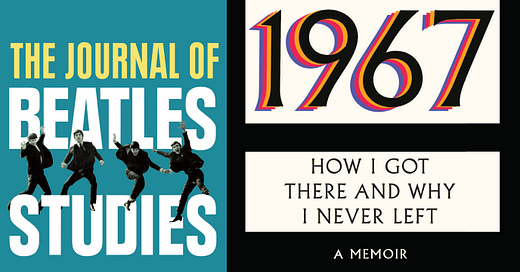Book Reviews: The Journal of Beatles Studies; 1967 - How I Got There and Why I Never Left
"There's a house burning down, on the radio," noted Beatle Dennis.
Let’s face it, honestly, when you have a deep abiding interest in music, books may seem a far-off prospect. And as Elvis Costello famously said, writing about music is like dancing about architecture. But if that were true, we wouldn’t be here.
The Beatles first and foremost are THE band. It’s not too much of an understatement to denote them as the start of something big. Which in turn, begat Robyn Hitchcock, who has unapologetically and lovingly acknowledged their influence on his work.
Thankfully, the importance of reevaluating our interest and some would say our livelihood with music has emerged in these two reads.
The Journal of Beatles Studies (Liverpool University Press) is the third in an ongoing series of Open Access academic essays and reviews on the Beatles’ impact on popular culture. Scholarly research and examination of the band’s influence is an ongoing fascinating delve into an area that the general public may not even be thinking about when it comes to the Beatles. However, as I’ve discovered, it takes a certain person, a certain fortitude in tenaciousness, to discover something new, thought-provoking and insightful about a band that has literally and figuratively, changed the history of music.
Most academia-based analysis and writing on the band is a struggle and balance between decades-assumed facts and the mountain of evidence that continues to unravel the fables supplied by ‘those in the know.’
There’s much to delve into in this edition, including Hans Olof Gottfridsson's dissemination of the band’s introduction to Hamburg and the transformative effect it had before superstardom hit. Martin Shough has an informative take on Paul McCartney’s intense interest in politics and involvement in projects that would cast him more in tune with cultural events, rather than the perception as a ‘superficial tunesmith’ and follower of John Lennon.
“Get Back” in Apple Basement | The Beatles: Get Back | ©Disney+
David Thurmaier weighs in on the myth surrounding “Maxwell’s Silver Hammer,” while Nick Williams examines leadership, entrepreneurial teams and the reasonings in his essay “Carry that weight.” Andrew Wilson dives deep into French cultural theorist and commentator Pacôme Thiellement and his 2002 book Poppermost: Considérations sur la mort de Paul McCartney [Poppermost: Thoughts on the Death of Paul McCartney], with an insightful treatise on understanding the band from a non-English speaking background.
Editorial reviews of recent books on the group include Blackbird: How Black Musicians Sang the Beatles into Being by Katie Kapurch and Jon Marc Smith, Deirdre Kelly’s Fashioning the Beatles, Living the Beatles Legend: The Untold Story of Mal Evans by Kenneth Womack and The Beatles in Perspective: A Carnival of Light, edited by James McGrath and Peter Mills.
The Journal of Beatles Studies is a groundbreaking publication that offers an interdisciplinary approach to examining the cultural, musical, and historical impact of The Beatles. By bringing together scholars from various fields, the journal not only deepens our understanding of the band's influence but also highlights the broader social and artistic contexts in which they operate.
Robyn Hitchcock was a young impressionable lad of 14, marking time as an ‘inmate’ at the boys-only institution Winchester College when he discovered Bob Dylan, participated in a ‘happening’ with Brian Eno, and ultimately realized his future with Sgt. Pepper’s Lonely Hearts Club Band. His just-published memoir 1967: How I Got There and Why I Never Left (Little Brown Books - UK and Akashic Books - USA) is Hitchcock with a twist to the heart. Blending his brand of humor (and if you know, you know), whimsical anecdotes, (a fish pond beneath the floorboards of his house; astute observations of his grandmother’s living with the family or sneaking away in the dead of night for a collegiate gathering of inmates for an album listen), historical facts (or hysterical, depending on what you know about Hitchcock), sketches of heads in balloons, and an overall sense of concern, we’re on a collision course with not only how Hitchcock evolved during this period, but what kind of person he has become. He gives hints about his parents’ relationship (close but not entirely agreeable, darling) and his schooling, describing several boys by nickname (Gallows, Harpo, Scraper, Mudfellow) and revelatory sounds emitting from the portable record player at Hogsworth Gone Wild. He also paints himself as a quiet attendee in life during 1967, prone to fits of unexplained introverted rage, trashing and ripping things dear to him at various times in the expanse of his schooling days. While he hasn’t become Bob Dylan (thankfully); to this day, he’s still the best version of himself… from 1967.








Amy, that's so exciting! Congrats! I mean, you're the perfect person for this.